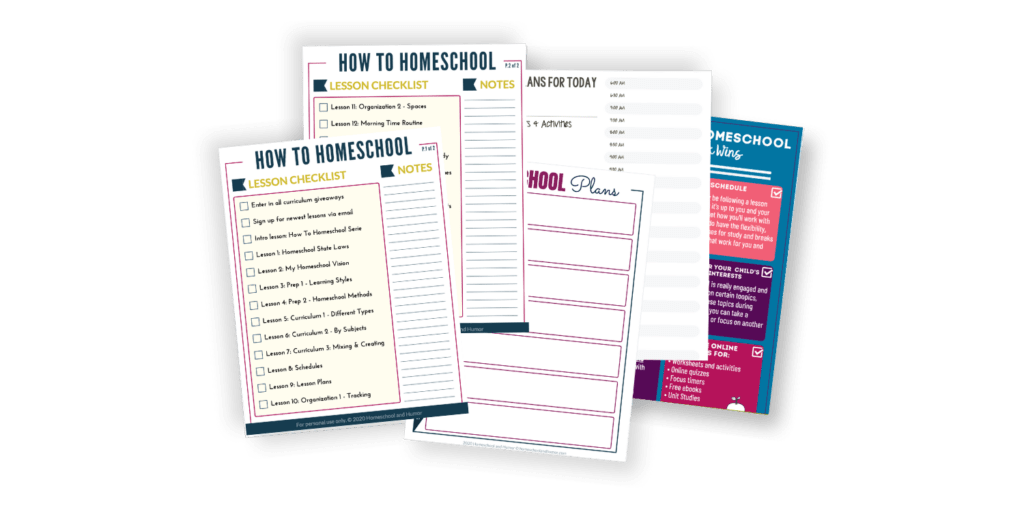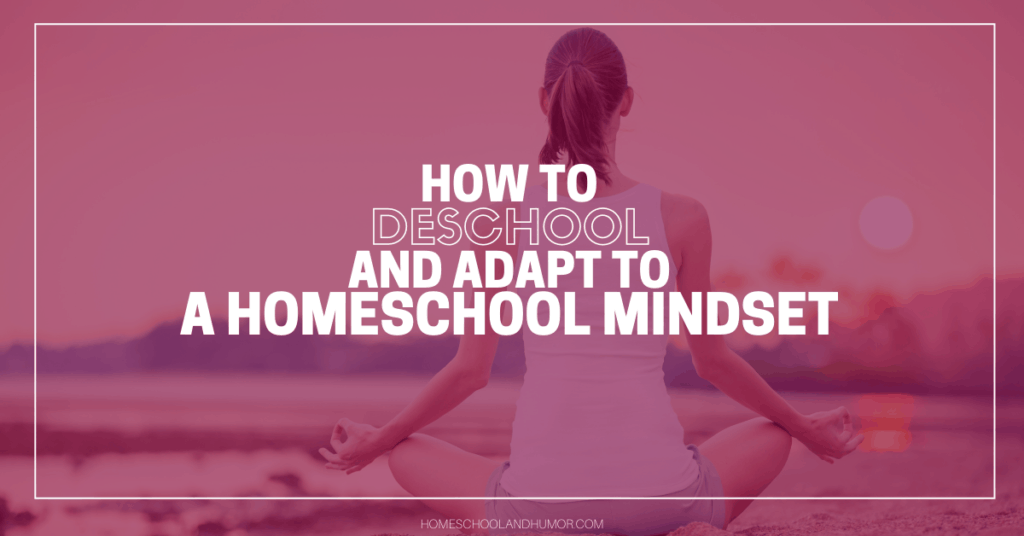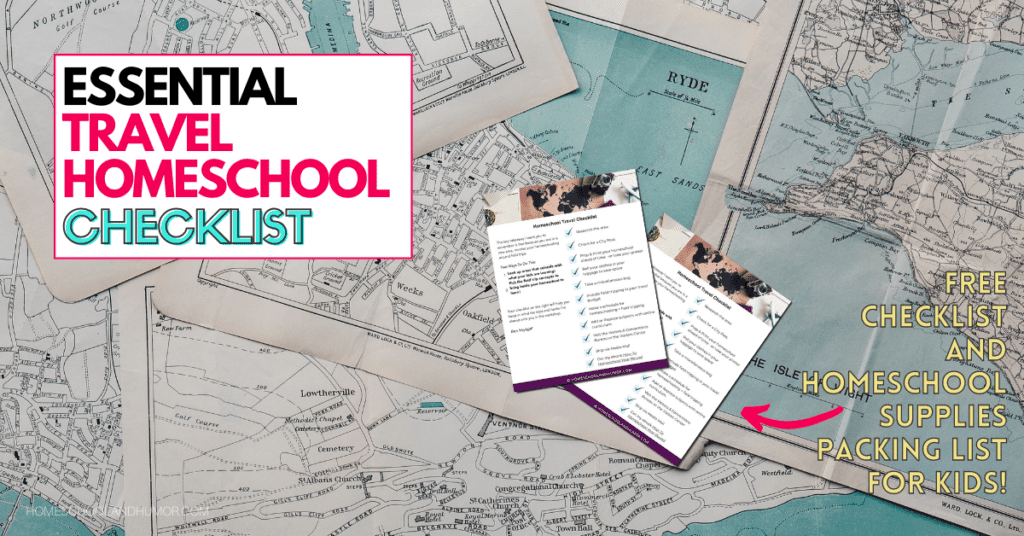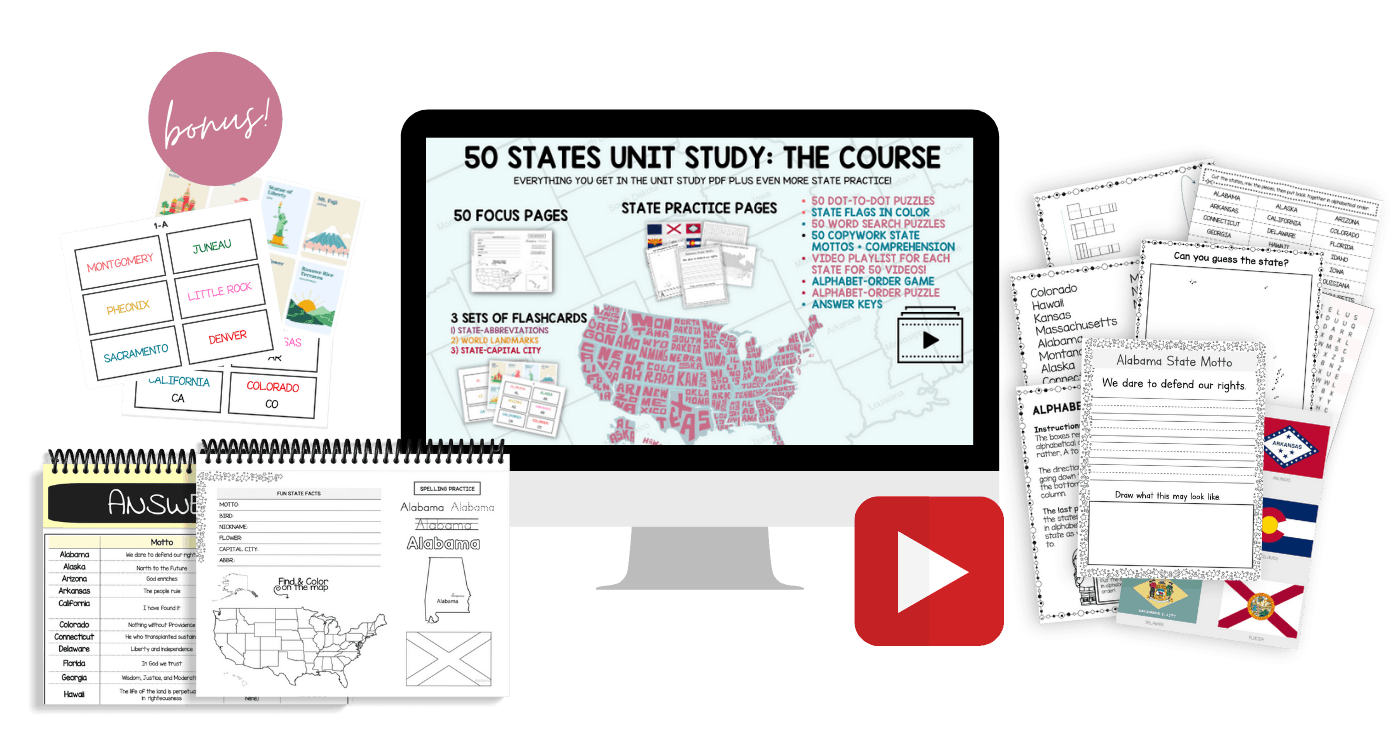This is Lesson #2.5 of the How To Start Homeschooling 20-Lesson series!
Although I was initially going to add this particular information in Lesson #2: Homeschool Vision, I think it is important enough to create a whole new lesson on its own.
You may still have it in your mind that you have to follow a certain procedure to homeschool correctly, but that’s simply not true. So in this lesson, we’re going to reinforce your mindset when it comes to educating your children (because remember, you already impact them in every other area!).

Disclaimer: You may find affiliate links for your convenience. See our disclosure policy here.
There are three criteria or elements of homeschooling your children that I want you to keep in mind. First, it’s knowing that you are in fact “a homeschool” and not a public school. Second, it’s understanding you have complete control and freedom of what you do and when you do it inside your homeschool. And finally, we all have something that tries to keep us in bondage or in chains, attempting to keep us from moving forward, such as ‘the perfect homeschool’ ideal or maybe you compare your homeschool to other families – don’t do this.
We’ll address all of these and knock them out of the park in this lesson.
Quick Navigation
You Are Homeschooling
Your homeschool is not a direct reflection of public school. You will not have your children sitting down at a desk at 8 AM sharp and staying put there until 3 PM. First, that is simply unrealistic. Not to mention unhealthy for both you and your children. So don’t try to mirror or replicate ‘public school at home’.
Your first order of business before anything else is to know that homeschooling is much more different than public schooling. It is freeing. It is open-minded. There is freedom to do whatever you want to do for your children to grow and learn. And there are many ways to do this, to teach your children, besides the traditional ways that we are all used to when we were growing up.
Clearly you aren’t teaching 30 children in a classroom. So your homeschool days will be MUCH shorter – and that’s normal. In fact, that’s encouraged! The only reason why it takes so long at public school is because the teacher has a classroom full of children. And that classroom is full of children who learn differently. You only have your child or children to teach to and you already know, or you will know very soon, how your child learns (their learning style).
Because of this, you’ve already cut your days in half! Your homeschool days will be shaped completely different from what you have seen at a tradition school. Because you’re homeschooling your children, the ‘home’ in homeschool is much more defined. You will soon learn that mixing ‘regular life’ with ‘homeschool’ ultimately becomes one in the same.
And when this happens, you’ve successfully made homeschooling a lifestyle. There is no beginning and no end to learning. Education will bleed through all areas of your home life. You will learn to take advantage of learning opportunities that are outside of your ‘homeschool time’ and then you will realize that your children wouldn’t have been able to learn those specific objectives or concepts anyway else had they not been homeschooling.
You Are Large and In Charge
Next, understand that you really are in complete control. You can homeschool first thing in the morning or after lunchtime. Maybe your work schedules are quirky and so homeschooling in the evening time is best for you. Or perhaps it’s just open-season for you, meaning you can homeschool whenever during the day or night that you want.
Many families have alternating work schedules, so the husband and the wife takes turns homeschooling while one goes to work. However it works out for you, it’s completely ok. The laws don’t tell you how to homeschool.
I recommend beginning your homeschooling day when your children are the most receptive to learning. The most alert at a particular time of day. There is a certain time in the day for all of us where we are the most in-tune and productive, where we are wide awake and ready. Learning is easier at this certain time of the day, which makes teaching things easier for you.
Your children’s special time could be right when they wake up or after breakfast. Maybe they shower in the morning, so after the shower they’re fresh and alert and ready to take on the day. Or perhaps it isn’t until after lunchtime where your kids are really ready to get their hands into creativity and their brains turning.
Use this time wisely. It will be much easier to teach your children during their special time than forcing a time upon them that doesn’t mesh well with their natures. At least for a while. If you truly desire homeschooling immediately after breakfast or at a certain time of day every day, then go ahead and teach at that time then. As I said, you can do what you want. Some times first thing in the morning is easiest for Mom. And these special times can certainly be learned to love.
However, there may be subjects, like math and grammar, that need to be taught individually anyway, so why not do it separately at their special time? This might be easier for you while you’re first starting out because you won’t be fighting the stubborn child trying to get them to pay attention at a time where he or she is clearly not alert and ready to receive yet. And then later, once you’re used to homeschooling every day, work your way towards your desired time. (That’s what I did.)
If you have children who has a special time in the morning and one in the afternoon, you can teach them separately at these times on the subjects they aren’t able to do together as a family (such as history, Bible, etc.). You control how your day works. You’re in charge of how to homeschool.

Take Care of Your Thoughts: Control Your Homeschool Mindset
Lastly, take care of your thoughts while you’re getting used to homeschooling. Your thoughts are powerful. You become what you think. Daily positive affirmations work wonders! You begin to believe what you continue to tell yourself, whether this it’s some good stuff or whether it’s ugly stuff. Just don’t be so hard on yourself that you’re self-sabotaging your brilliance.
You’re wise, wonderful, and very capable to homeschool your children. You’re their mother, or father, and you already know what is best for them more than anyone else. It’s no different when educating (or impacting) them on math roots and parts of speech.
Because each homeschool is unique for so many reasons, it is silly to compare yours to others. But we all do it. I’m guilty of this tragedy myself. But what I’ve learned is just that – everyone has a totally different family dynamic and individual goals and varying beliefs. You won’t be comparing apples to apples, I promise.
You can gain inspiration through learning about other homeschool families. You can get ideas, even better ways to go about doing stuff when collaborating with other homeschool moms. I can’t begin to tell you how much I’ve learned from other moms. They’re amazing. And it’s oftentimes things that never occurred to me.
But don’t beat yourself up just because you don’t know what you don’t know! If you’re confused and just plain lost on where to start homeschooling, that’s very okay, and very normal. Like driving, the more you do it day by day, the easier it will become.
So if you have chains that are holding you down because of anxiety or worry or even self-discipline, or maybe you are unsure about how to go about something, break those chains. Give yourself permission to be okay with simply Not Knowing. And then work your way through by practicing one idea or suggestion after another. You’ll soon piece together your own unique, wonderful homeschool that fits perfectly for your family
. You’ll like doing things a certain way, and you’ll not like doing other things. This is what will make you different and just as perfect as your neighbor! It takes a while to get to the part of a comfortable homeschooling rhythm, and that is also normal. You must homeschool consistently to eventually get to this steady rhythm. Practice makes near-perfection!
Deschooling: What Is It?
You may have heard the term deschooling around Facebook groups or other homeschoolers. And while deschooling is not required for anyone, it is highly recommended. Even from the most seasoned homeschoolers, we all encourage new homeschoolers to deschool first thing.
What is deschooling? It is a transition period. It is going from one way of life to a totally new way of life, such as kids used to public school and then abruptly becoming homeschoolers. It allows your child a period of time to adjust and disconnect from the rigorous public school mindset.
Deschooling will significantly impact and improve your mindset for homeschooling. It is where you either don’t homeschool at all or you do very little school for awhile. It assists both the children and the parents in getting used to homeschooling.
Some deschool for a few months before they begin their homeschool year, which means their homeschool year would begin not in August but perhaps in October. Such is the way we did it.
When we started homeschooling, I did not start immediately in August. We did not mirror the public school system schedule or calendar. I did a little bit at a time, and then officially declared October 1st to be our first full day of homeschool.
Some families deschool for a few weeks. Some, like my family, deschool for a few months. To determine how long you should deschool depends on how well adaptable your children – and yourself – are. If your children are able to adjust to new conditions fairly swiftly, then just take a few weeks off.
How will you ensure your child isn’t behind in school if you deschool?
This is a good question. And this is where it’s important to have that open-minded homeschool mindset. Think about this for a second: Your child is struggling with a math concept. They can’t exactly understand regrouping, such as borrowing or carrying over.
Now, in a traditional school setting, your child will either need to get a tutor, stay after school to continue learning, do Saturday school, or you will need to teach them every night when they get home. The classroom itself will not wait for your son to finally master this math concept and will need to move on.
But since your child is now homeschooling, they have the wonderful advantage of taking their time to really understand this concept. Say it takes a couple of weeks long for them to master this regrouping concept and your beautifully planned lessons or schedule are now down the drain.
What would you do? Would you act like the public school and insist your child either learn the concept in a timely manner or will be left behind, having to learn the next newest concepts just to keep on schedule?
Probably not. At least, I would hope not! This is similar to the scenario of deschooling. It will take a chunk of time from your year, but it is well worth it.
The time that it does take up you will be able to make up later in the year. Because you are not a public school you do not have to take off the same weeks that they do or even the same months that they do. While public school takes off 3 weeks in December, you can continue to school and then take off a week and a half. While they take off Spring break, you can decide to school during Spring break.
And while they are of 3 and half months for summer, like us, you can choose to continue homeschooling through these hot as heck summer months.
Additionally, say your child did struggle with regrouping and it did take 3 weeks to master. But say the next concept, while scheduled to learn it for about 8 days your brilliant child actually gets it immediately after day 1. Would you keep teaching these concepts for him to do over and over every single day, even though he’s completely mastered this concept? Probably not.
In this case, you can now move on to the next concept “ahead of schedule” per say. Do you understand what I am saying? This is how your homeschool will be balanced. Even if you take a few weeks longer to complete a concept, there will undoubtedly be other concepts that take NO TIME for your child to master. This is a wash and this is how your child will not be behind.
Same with deschooling. If you decide not to deschool, you do risk your child from grasping the entire concept of homeschooling. Things may be a little slower to understand at first. Days may be longer. Lessons may not even be completed or may be skipped entirely just because it takes too long during the day to get through. It could take a lot longer than anticipated to either teach your child or for your child to understand something.
By deschooling, you are giving your family a way to ease into the new homeschooling lifestyle.
Grab the lesson checklist for all the lessons in the How To Start Homeschooling 20-lesson series! Click the image to download!

What To Do When You Deschool
Here are my recommendations on what to do if you decide to deschool. I’m not saying don’t do a thing for a few weeks to a few months. Don’t be lazy squatters all day without being productive. That’s no way to adapt to the homeschool lifestyle.
What I am saying is that you should declare an official day as your start date. A date that is either a few weeks or a couple months into the future. This can be your goal date. And then within the weeks leading up to your start date goal, still do homeschool.
During your “practice” or your “warm up” homeschool days, proceed to homeschool. These days will strictly be for getting used to homeschooling and for finding your personal family homeschool rhythm.
You guys will see how long certain lessons of certain subjects will be. You will be able to identify areas of improvement without it affecting your planned lesson plans or your schedule. It will keep your year on track. And it will prevent you from feeling behind or overwhelmed.
So plan your lesson plans to begin at a later time. And take the first few weeks or a month or whatever to have light homeschool days. See how your rhythm is.
You will learn how to teach your children too. You can practice different times of the day to see when during the day your children are the most alert and receptive.
You will also be able to identify exactly how to teach all of your children if you have more than one. For instance, if you are teaching math one-on-one you can teach them at separate times. You will learn that while you are teaching Child A math, you can have Child B do is writing or his grammar work or his reading.
As you go through these motions day after day, you will find your rhythm and your perfect homeschool daily schedule.
Without deschooling, you simply risk mental pressure, weary days, and a scattered homeschool mess. Give and allow yourself and your kids time to adapt into your new lifestyle. It will be ok and you will not be behind.
How To Deschool And Adapt To A Homeschool Mindset Conclusion
With these three homeschool mindset criteria and the deschooling recommendations, I hope you will find your homeschool rhythm that naturally fits for your family. Remember that you have control over your homeschool. And know that the year will balance itself out even if you deschool or spend “too much” time on a particular concept.
To read the previous lesson, go to Lesson #3: Creating Your Perfect Homeschool Vision Statement
To read the next lesson, go to Lesson #4.
Share this on Pinterest if you loved it!

- 111 Best All-Time Middle School Movies List (In Categories!) - April 26, 2024
- Top 16 Indoor Games for Teens That Won’t Turn Your House into a War Zone - January 29, 2024
- Free Crafty Printable Christmas Countdown Calendars For Kids - December 17, 2023










